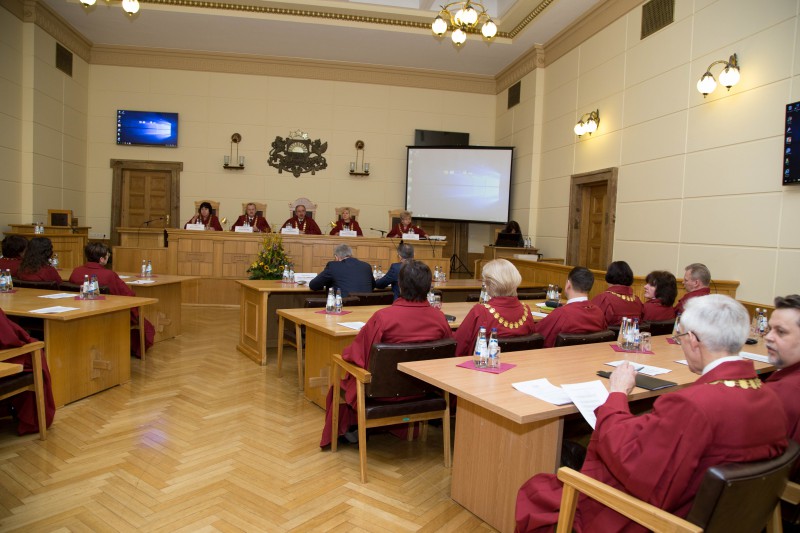ESSENTIALS OF THE WORK OF THE SUPREME COURT IN 2016: THE REFORM AND DECREASE IN ACCUMULATION OF CASES IN THE DEPARTMENT OF CIVIL CASES
6 March, 2017
The Supreme Court has successfully concluded the year 2016 which was the year of two significant judicial reforms in the history of courts of Latvia. Now, the Supreme Court is ready to operate having new status, being merely the cassation instance, as was stated by the Chief Justice of the Supreme Court Ivars Bickovics at the Plenary Session of 3 March.
Last year the territorial reform of courts continued, reducing the number of district (city) courts and completing the transition to a clean three-instance court system, thus terminating the work of appellate instance – the Chambers of the Supreme Court. As was noted by the Chief Justice of the Supreme Court, the termination of work of the Chamber of Civil Cases in 2016 was more successful than the same process two years ago regarding the Chamber of Criminal Cases, since the regulatory framework of the reform this time was more understandable, and due efficiency of the Chair of the Chamber of Civil Cases Ineta Ozola in administering the work of the Chamber during its last year of operation.
Furthermore, by strengthening the Supreme Court as a cassation instance, a series of organizational and human resources-related measures have been carried out. First of all, the qualified judges support staff was expanded. In 2016 the reorganized Division of Case-law and Research commenced its work, having more functions and increase in number of staff. Also the number of judges’ support staff in departments has increased - 36 judges are supported by 41 legal assistants, 5 scientific advisors and 3 consultants.
The other major characteristic of the work of the Supreme Court in 2016 was a positive balance of cases – the number of cases pending in the Supreme Court has decreased by 37%. It is not only the result of termination of work of the Chamber of Civil Cases, since also the number of cases pending in departments has decreased by 25%, and the end of the 2016, this number constituted 1,849 cases.
As noted by the Chief Justice of the Supreme Court, all departments had intense workload and examined a total of more than 4100 cases. Workload of judges (examining in average 117 cases a year) at the cassation instance is unacceptably high. The positive trend that allows predicting a reduction in the number of cases received by the cassation instance should be a smaller number of cases received by lower courts, as well as amendments to procedural laws.
The Chief Justice of the Supreme Court drew particular attention to positive results of work organization and intense activity of the Department of Civil Cases – the number of cases pending has decreased by 24%. Given that in recent years the accumulation of cases in the Department of Civil Cases of the Supreme Court was the main issue, these positive results of performance of the Department of Civil Cases are particularly important.
Ivars Bickovics emphasized the directions highlighted in the strategy of the Supreme Court as the priorities for future work of the Supreme Court – fair and efficient court and strengthening the authority of the Supreme Court. The Chief Justice noted that both of these directions are interrelated, and the positive thing is that the name of the Supreme Court both in terms of rulings and penal policy is mainly associated with professionalism and substantiation of rulings, which is a precondition for the court's authority. The Chief Justice invited the Supreme Court judges to not forget their special mission in their daily work: "I invite you to internally feel and work as leaders and purest professionals of the court system of Latvia, and gain the trust and authority in the eyes of the society."
The Plenary Session related to annual report of work of the Supreme Court was attended by 29 of 36 judges and one acting judge of the Supreme Court. The work of structural units in 2016 was analyzed by their leaders - the Chair of the Department of Civil Cases Edite Vernusa, the Chair of the Department of Criminal Cases Peteris Dzalbe, the Chair of the Department of Administrative Cases Veronika Krumina, the Head of the Administration Sandra Lapina, the Head of Division of Case-law and Research Anita Zikmane. Judges also heard information about last year's cases provided by the Chair of the Disciplinary Court Aigars Strupiss.
The Plenary Session was also attended by the Prosecutor General Eriks Kalnmeiers and the Minister of Justice Dzintars Rasnacs.
More about the Plenary Session of 3 March:
- Accumulation of cases of the Supreme Court has decreased by 37%.
- Suggestion to strenghten the role of departments in selection of candidates for office of judge of the Supreme Court
- President of the State: Confidence in professional and fair judicial system of Latvia must be strenghtened
- Judge Inguna Radzevica is re-elected to the Disciplinary Court
Information prepared by
Rasma Zvejniece, the Head of the Division of Communication of the Supreme Court
E-mail: rasma.zvejniece@at.gov.lv, telephone: +371 67020396, +371 28652211


